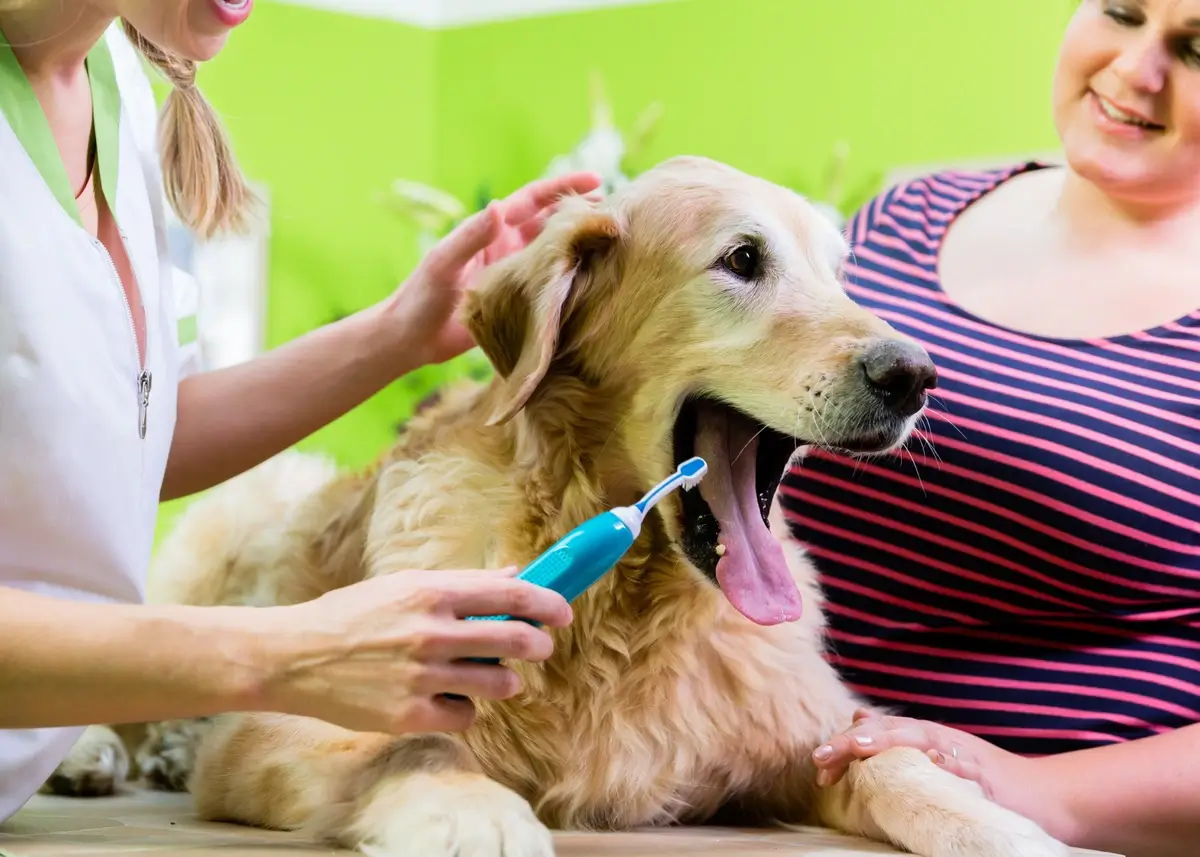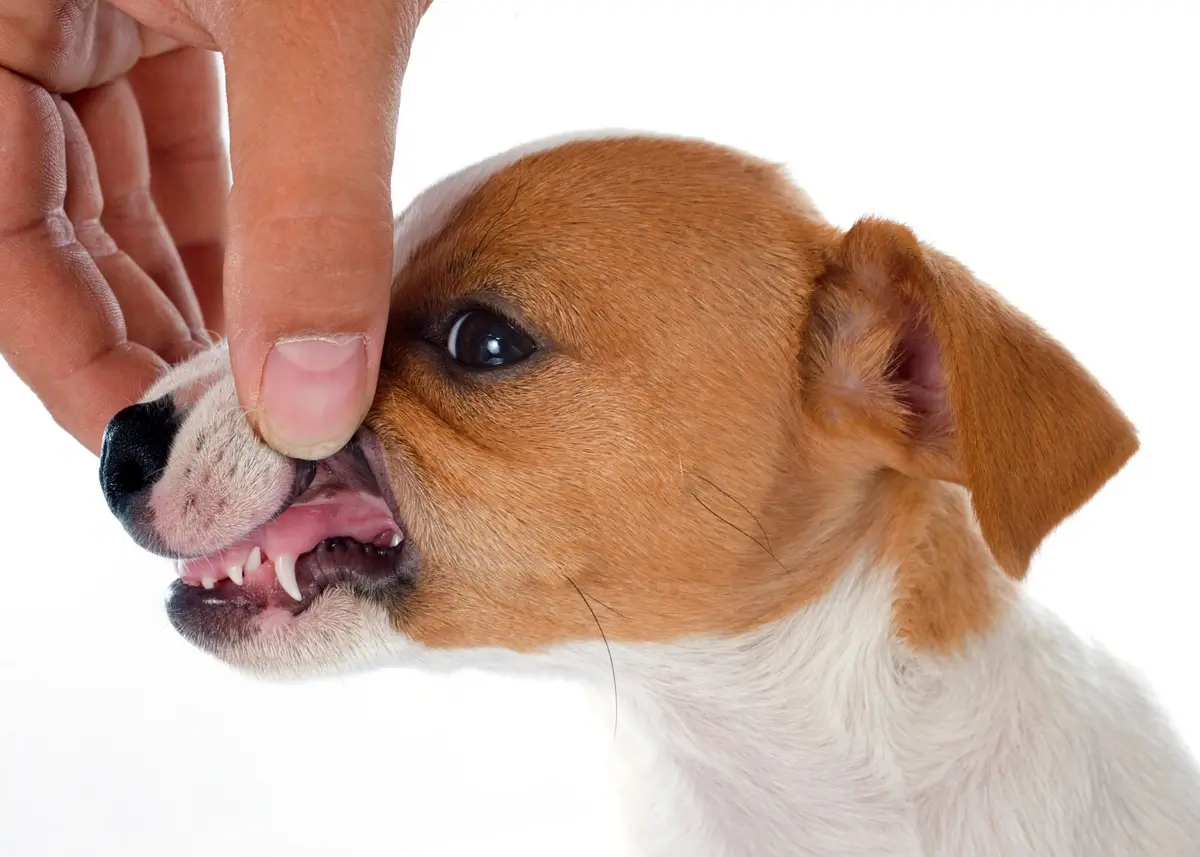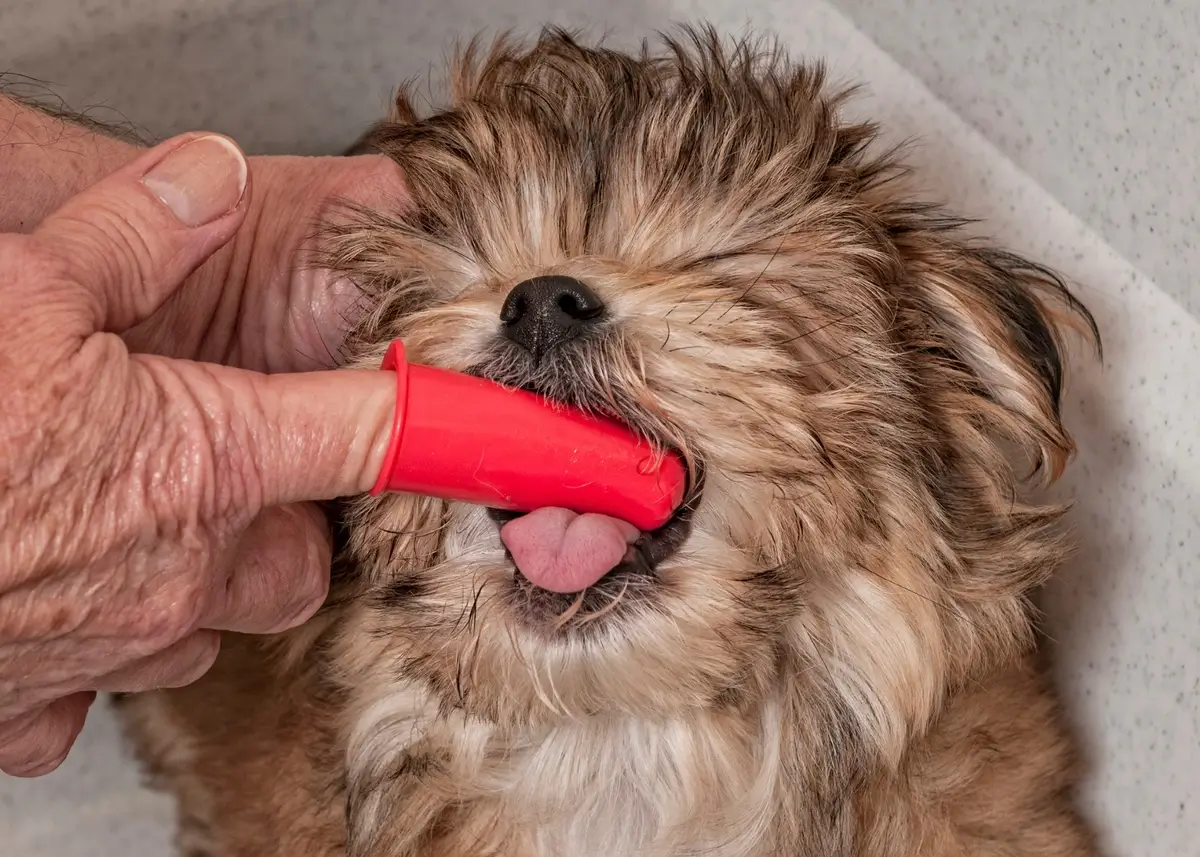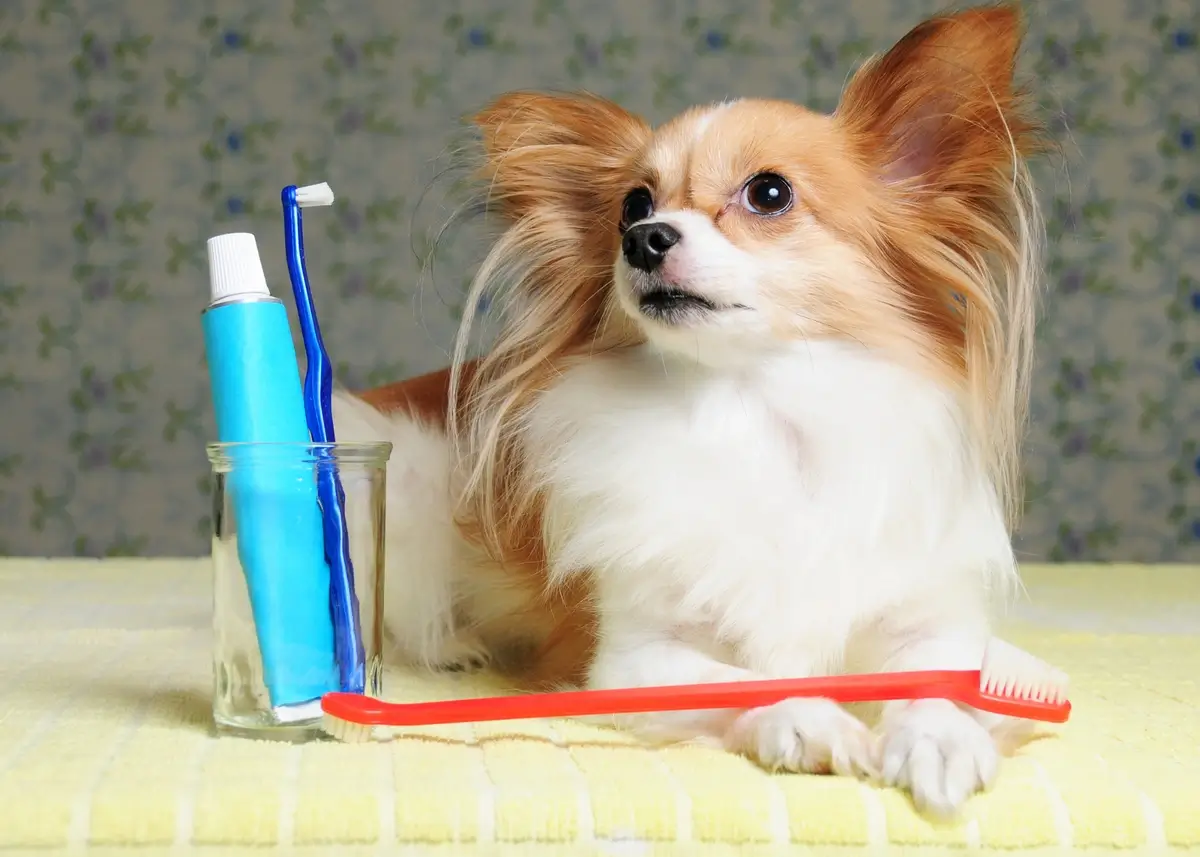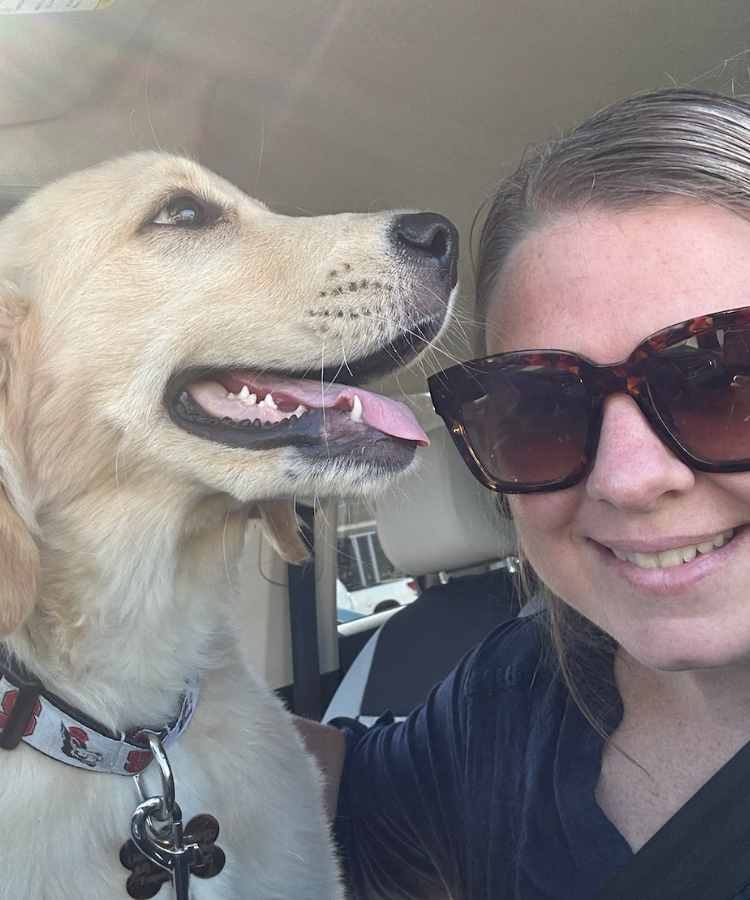There’s nothing like the sweet smell of puppy breath in your face! We think it’s one of the best parts of bringing home a new puppy. However, that puppy breath disappears quickly and can turn into the lovely scent of rotten gym socks if you neglect your puppy’s oral hygiene when their adult teeth start to grow in – sooner than you may realize.
Having a healthy, happy puppy is all about taking care of them from the inside out. Maintaining a healthy mouth is part of being a responsible, caring dog owner. As much as we’d love to train our puppies to brush their own teeth, they rely on us to keep them healthy. Puppy dental hygiene includes regular brushing of the teeth as well as regular dental checkups from your vet.
You may be wondering about puppy dental care basics and how to make sure you keep your puppy’s teeth clean. Here’s what you need to know about puppy teeth, how to care for puppy teeth at home, puppy dental products, and what to expect at your puppy’s first dental visit.
How Are Puppy Teeth Different from Human Teeth?
While human children grow 20 teeth by around age 3, puppies have 28 temporary puppy teeth called deciduous teeth that start poking through their gums around 2-3 weeks old and will have a full set of 42 adult teeth around 6 months (or longer depending on your puppy). Fun fact: Chow Chow puppies have an extra set of molars to total 44 adult teeth!
Keep in mind that every dog has the same amount of teeth regardless of jaw size. This means a teacup Yorkshire Terrier puppy will have the same number of teeth as a Great Dane puppy! We’ll talk more later on about how a puppy’s skull size can affect its dental health.
Just like human teeth, puppy teeth erupt through the gums in stages. Incisors (middle front) teeth come in first, 6 on the top and 6 on the bottom. Next come the 4 canine teeth, the curved, sharp “fangs” located on the outsides of the incisors. Lastly, the pre-molars come in. A puppy will not grow baby molars – they only will grow permanent adult molars.
When these puppy teeth begin to fall out or become loose starting around four months old, puppy parents can discover this in a most painful way by stepping on a tooth barefoot, usually a pain reserved for stepping on Legos! Welcome to learning how to survive the puppy teething stage!
How to Care for Puppy Teeth at Home
Taking care of your puppy's teeth may seem like a daunting task, but it's actually quite easy! It’s important to give your puppy the best possible dental hygiene regimen to keep their smile healthy for years to come.
When should I start brushing my puppy’s teeth?
Brushing puppy teeth should start as soon as you bring your pup home. Get them used to having fingers and objects in their mouths. Let your puppy taste a bit of toothpaste (try meat or peanut butter-flavored) as just a treat in and of itself. The goal is to condition your puppy to associate the toothbrush and the act of brushing with an exciting, positive experience.
What techniques should I use for good puppy oral hygiene?
After you’ve introduced your puppy to the feel and taste of a toothbrush and toothpaste, you may be wondering how to brush your puppy’s teeth. Some people use a damp washcloth for the first few puppy brushing sessions as well.
Begin with the canines. Put a small amount of toothpaste on your puppy's toothbrush or silicone sleeve. Use circular motions with a gentle touch. Start with small sessions with a positive attitude. At first, you may only get to one tooth, and that’s okay! Gradually build up your ability to work your way to the back top and bottom molars, which may take several sessions over the course of a week or so. Keep at it until you can increase the length of the sessions and how many teeth you can brush.
Be sure to give treats and praise right after each attempt! It’s okay to abandon the session if it’s going comically bad, but be sure to persist in this important effort to keep your puppy happy & healthy.
As humans, we may find it strange and even unpleasant to eat something directly after brushing our teeth. However, puppy toothbrushing doesn’t work that way. You won’t undo all your hard work by giving your puppy a treat. Also, don’t worry if your puppy swallows toothpaste. They don’t have the ability to spit it out as humans do, and the ingredients of a puppy-specific formula will be gentle on their tummies when swallowed.
How often do I brush my puppy’s teeth?
While brushing your puppy’s teeth ideally would happen every day, brushing should be done at least twice a week to remove plaque and tartar buildup.
Only use dental products safe for puppies
Don’t use human toothbrushes, toothpaste, floss, or even let your dog drink mouthwash (this one may seem like common sense, but of course, we had to mention it). All of these products may be safe for human use, but they can contain ingredients that can be extremely toxic to dogs. Puppy toothbrushes are designed with much smaller heads with very soft bristles, so make sure to use a specific dog toothbrush. Choosing products that are pet-safe and non-toxic is the way to go.
Did you know you can use more than just a doggy toothbrush to care for your puppy’s teeth? Explore some of the many puppy dental cleaning products to determine which options will work best for you.
- Dental spray
- Dental wipes
- Dental powder
- Puppy-safe Toothpaste
- Dental water supplements
- Special dental dog treats and chews
- Dental dog toys with knobs and grooves
- Puppy toothbrush: silicone finger sleeve or soft bristles
Do Some Breeds Require More Dental Care?
While of course all dogs need dental care, there are some breeds that do require extra attention in their puppy dental care regime mainly due to the shape of their skulls and jaws. It’s important to know your dog breed’s dental care needs to plan how you are going to meet them to maintain great puppy oral hygiene.
Dental care for small & snub-nosed puppies
Remember when we said that all dogs (except the Chow Chow) have 42 adult teeth regardless of size? Due to a narrow skull, small dog breeds have less bone to support their teeth. This opens the door for more dental problems than a dog with a much larger or wider skull.
Snub-nosed dogs will also need to be checked for teeth that are too tiny or growing in sideways. Their jaws can also grow misaligned. All of these complications can cause further health problems like periodontal disease in dogs.
Professional Puppy Dental Care
While a DIY home puppy dental care routine is necessary, you should always consult with your trusted, licensed veterinarian regarding proper dog dental care.
What to expect at your puppy’s first dental checkup
Your puppy should have its first dental checkup when it’s around six months old. During this checkup, your vet will examine your pup’s teeth and gums to make sure everything looks healthy and normal and there aren’t any deciduous teeth remaining. They will also discuss any concerns they may have and answer any questions you may have about puppy dental hygiene or puppy teething stages.
Your vet may also recommend professional teeth cleaning or other treatments if necessary. This is especially true if your pup has had plaque or tartar buildup on its teeth before its first checkup. Regular professional teeth cleaning will help prevent further damage to the teeth and gums, as well as prevent future issues such as gum disease or bad breath.
When to call the vet about puppy teeth concerns
If you notice a dental issue, call your veterinarian immediately to get advice on either how to treat the issue at home or to determine if you need to come in right away (or in unfortunate circumstances, if you have to go straight to an emergency veterinarian).
What Happens If I Skip Puppy Dental Care?
Brushing a puppy’s teeth should not be a once-a-year type of activity. If you fail to care for or keep up with your puppy’s dental needs, you may not realize the severe health issues that poor dental care can lead to, including:
- Drooling
- Bad breath
- Broken teeth
- Crowded teeth
- Bleeding gums
- Impacted teeth
- Abscessed teeth
- Periodontal disease
- Jawbone deterioration
- Kidney & heart infections
- Plaque and tartar build-up
How is proper nutrition linked to healthy puppy teeth?
It’s important to remember that proper nutrition plays an essential role in keeping your pup’s teeth healthy too! Feeding them high-quality foods that contain all the vitamins and minerals they need will help ensure their pearly whites stay strong and healthy for years to come.
Maintain Your Puppy’s Bright Smile
Keeping your pup's pearly whites happy and healthy doesn't have to be difficult. With regular brushing and checkups from your vet, you can ensure their oral health stays in top condition! There are plenty of ways you can keep their smile looking great. So get brushing, take them for regular checkups, and don't forget to give them plenty of yummy treats along the way! With these tips in mind, you'll be ready to show off those shining smiles in no time.
Care for a Pawrade Puppy’s Pearly Whites
Pawrade offers plenty of smiling, happy, and healthy puppies who can’t wait to show you their tiny pearly whites! We partner with vetted, reputable breeders to offer puppies for sale that are ready to flash their precious smiles at you for a lifetime.
